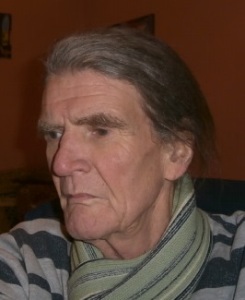Ch. 1.
1.
Behold, thou art dark and comely, my love;
richly hath the sun favoured thee,
delighting in thy presence.
Let me savour thy kisses of wine;
for in the gardens of the temple
the lotus furls open,
wild bees fall asleep on her face.
2.
Lilies and jasmine bloom
in the garden of my love;
falls of wisteria,
carpets of thyme.
Let us lie in the shade of the olives
to gaze on the sky.
3.
For many hours my love slept
beneath the cedars,
couched on cool swathes of linen,
like the Lord of Midnight enthroned on a cloud.
Long tresses of willows shivered to cool his face.
I called his name but he heard me not,
being entranced in slumber,
deep in the thrall of dreams;
therefore I shall let him awaken when he please.
Ch. 2.
4.
A warm breath of nard is my master, my king,
A great golden deity haloed with stars.
Behold, the noble bearing of a king,
the finely-wrought body of a man.
In my dearest dreams he standeth before me
out of my reach, gesturing for me to follow,
calling unto me like the very embodiment of love.
5.
Night comes softly, o daughters of Jerusalem,
My king’s desirous eyes have grown heavy with sleep.
His black hair ripples about his face
like curtains of smoke,
gold bracelets entice my gaze to
the sinews of his arms.
Like roses unfurling, so open the lips of my love,
I burn for their flavour,
yet awaken him not till he please.
Ch. 3.
6.
Out of the forest I came, with my
maidens and minions;
with carpets of hibiscus strewn at my feet.
Columns of frankincense curved into the air,
burning from lamps of copper and gold.
From the broad slopes of Edom
my soul’s love stopped to observe us.
I felt his warm gaze upon me,
so soft a look as touched like caresses of hands.
I am weary with desire, my lord and king,
Bring me the looks of thine eyes, dark as midnight,
That regard me with touches of silk.
7.
Though I may stand with my legion before thee,
an army behind me,
The west wind roars to my left,
the east to my right,
a million strong with all my banners, warriors
and standard-bearers,
still my delight were only to serve thee,
see how I tremble with awe by thy side.
8.
Behold, my ladies, the noble bearing of a king,
the finely-wrought body of a man.
My king is a custodian of the sanctity of love,
see those arms with the strength to smite
yet full of the will to embrace.
Nightly cometh he to my chambers,
whispering of love,
with the stealth of a lion,
as meek as a lamb.
Ch. 4.
9.
Preparing for my beloved,
I have put on my mantle of midnight sky
garlanded with stars.
My black locks are hung with beads of gold,
my neck is anointed with sandalwood and rose.
Come, my ladies,
Bring me my white chargers,
my sedan lined with silks from Lebanon,
my heralds and cavalcades of guards;
My beloved king awaits my pleasure.
10.
When I am in the embrace of my beloved,
He is worlds of landscapes of desire,
he is all the earth, air and sky to me.
His eyes shineth as my sun and moon,
his broad chest becometh as the
cool desert dunes by night,
where I may rest my head.
Go safely in thy dreams, beloved king,
with sentinel angels, to roost with the doves.
Ch. 5.
11.
Such a turmoil of a dream
hath troubled me, my sisters,
I dreamed that my love approached my window,
Calling unto me through the
rosewood trefoils of the lattice.
Forgetful of our tryst I answered him not,
all oils and fine trappings were put away,
mine eyes were full of slumber.
When finally I rose from my bed
he had gone.
12.
Overwrought and afraid,
I went out in the streets,
calling unto my beloved,
receiving no answer and calling again.
The night watchmen came and found me,
they smote me and denounced me as pagan,
calling me harlot and worshipper of false idols,
harshly they beat me with flails
and threw me into the darkest cellars
of the palace of Solomon.
13.
Awakening at last,
I felt a warm breeze,
It was my love’s breath upon my face.
Let all the world suspend in time,
let hate, rage and darkness flee as a shadow,
otherwise let me die here in the arms of my king.
There is but this one hour, one place,
in one lingering moment,
When my soul’s love and I are conjoined
in the petals of love.
Ch. 6.
14.
Midnight has fallen in the gardens
of the temple of Solomon.
The moon communes with her sister in the lake,
painting the magnolias with mother-of-pearl,
turning her buds into silver doves.
Passion and beauty intertwine in my love’s garden,
Like the twisted trunks of the fig trees of Judea.
Behold, my beloved,
thou art more comely even than the moon.
Come and walk with me
in the balmy air of night.
15.
Only through the love of another may
a soul come to know of itself.
My king is mine and I am his;
The sun and moon each taketh their
turn in the sky,
the shepherds go sure-footed
over their hills and valleys,
the merchants go their ways in the
spice markets of Lebanon,
while he and I are lost in one another’s eyes.
Ch. 7.
16.
Love’s weariness hath overcome me,
beloved lord and king.
Bring me thy pleasant fruits, thy tender words,
Lie betwixt my breasts; my hair shall
be thy curtain,
these arms shall be as thy cocoon.
Let the tides cease their turning
and the winds give pause to hold their breath.
Awaken not my dearest love, until he please.
17.
Even in sleep,
such beautiful eyes hath my beloved;
his eyelashes rest upon his cheek
like the feet of a butterfly on a lily.
Come, my sisters, we shall make him
a bed of hemp and poppies,
with fruit of the lotus,
that he may languish beside me
for many days and nights.
Ch. 8.
18.
Filling my days and dreams,
here is a man with the grace of a young hart,
whose honeyed voice speaketh mantras of desire.
Arise and follow me, beloved, for my vineyards
are ripe with luscious fruits,
the doves beat their wings and fly from the cots.
Emerging from the amber of sunrise,
with a swirling of veils,
summer dances into the season of our love.
19.
Lying amid the twisting vines
My love and I are deep in each other’s embrace
and his lips taste of roses heavy with dew.
I am a queen of the Red Sea,
an orchid from a sacred garden,
and my kingdom reacheth to the farthest hills.
None but my love shall pass the boundary
where my vines bear the sweetest fruit,
nor taste their heady wine.
20.
The gates of my vineyard are wrought of
iron clad with gold,
taller than cedars, decorated with
the royal insignia,
guarded by three score watchmen,
by day and night.
While other men are kept without
and the foxes are driven back by dogs,
see how swiftly they open for thee.
Ch. 9.
21.
Behold, the noble stature of a king,
the finely-wrought body of a man.
In the sanctity of love
we may walk in the realm of paradise,
undisturbed by the foibles of men.
Come beloved, awaken,
the new dawn opens as wide and fresh
as infant eyes.
Come run with me through the spice hills
and gardens of Lebanon.

Sara Louise Russell, aka PinkyAndrexa, is a UK poet and poetry ezine editor, specialising particularly in sonnets, lyric-style poetry and occasionally writing in more modern styles. She founded Poetry Life & Times and edited it from 1998 to 2006, when she handed it over to Robin Ouzman Hislop and Amparo Arrospide; Robin now runs it as Editor from Poetry Life & Times. She is currently founder and Editor of the daily paper.li journal, Poetry Lifetimes ; which is a sister publication to Poetry Life & Times. Her poems and sonnets have been published in many paper and online publications including Sonnetto Poesia, Mindful of Poetry and Autumn Leaves a monthly Poetry ezine from the late Sondra Ball. Her sonnets also currently appear in the recently published anthology of sonnets Phoenix Rising from the Ashes. She is also one of the first poets ever to be published on multimedia CD ROMs, published by Kedco Studios Inc.; the first one being “Pinky’s Little Book of Shadows”, which was featured by the UK’s national newspaper The Daily Mirror, in October 1999. (Picture link for Mirror article)Angel Fire
robin@artvilla.com
PoetryLifeTimes
Poetry Life & Times
editor@artvilla.com
www.artvilla.com
Artvilla.com















